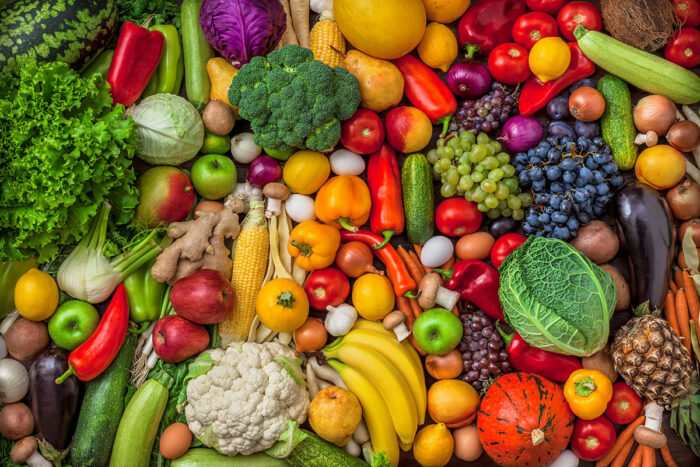Prescription program for fruits, vegetables could help improve community’s health
Collaboration with BJC HealthCare, Schnucks supports healthy eating to combat chronic disease
 GETTY IMAGES
GETTY IMAGESA new project called NutriConnect, led by Jing Li, MD, DrPH, of Washington University School of Medicine in St. Louis, will compare the effectiveness of two produce prescription approaches for encouraging healthy eating and addressing food insecurity.
To boost access to healthy food for St. Louis-area residents in need of improved nutritional options, Washington University School of Medicine in St. Louis is collaborating with BJC HealthCare and Schnuck Markets, the regional grocery chain, to fill prescriptions for fruits and vegetables.
People without access to nutritious foods, whether due to affordability, lack of transportation, or other interconnected reasons, are at increased risk of cardiovascular disease, diabetes and other chronic conditions. Increasing access to healthy food is a key strategy for chronic disease prevention and management.
Supported by funding from the American Heart Association’s Health Care by Food Initiative, the program aims to identify strategies to encourage healthy eating after a hospital stay. Further, the goal is to find strategies that can then be scaled up to include many more people in underserved areas and for longer time frames. Improved access to healthy foods has the potential to improve the health of whole communities, especially those with low-income residents or neighborhoods that lack grocery stores — so-called food deserts.
“What you eat can have a tangible impact on your overall health,” said principal investigator Jing Li, MD, DrPH, an associate professor of medicine at Washington University. “Food insecurity can contribute to the development of chronic conditions, so access to healthy food — particularly fruits and vegetables — can be a powerful tool for preventing, managing and treating diseases. With this grant, we hope to identify effective ways to break down barriers to food access that affect so many people in our communities.”
The estimated prevalence of food insecurity is higher for Black households than for their white counterparts. Nearly 23% of Black people in the United States have experienced food insecurity, which is almost 2½ times the rate experienced by white people, according to data from the U.S. Department of Agriculture. Food insecurity, hunger and an inability to access healthy food are matters of social inequality, which this study aims to address.
Li’s research project, called NutriConnect, primarily will compare the effectiveness of two produce prescription approaches for encouraging healthy eating and addressing food insecurity. In one approach, the program will provide biweekly Schnucks grocery coupons to participants to purchase food items selected by a dietitian. In the second, the program will provide a biweekly fruits and vegetables delivery from Schnucks to the participants’ homes.
The grocery coupon approach gives participants a choice in the food items they take home, while the delivery will provide preselected mixes of fresh, frozen and canned fruits and vegetables. A focus group of community members was convened to deliberate and decide on the assortment of fruits and vegetables to be featured in the grocery delivery. Their insights and preferences shaped the final selection of produce included in the deliveries.
“BJC believes in the power of community voices to shape solutions that truly serve the people,” said Deidre Griffith, BJC HealthCare’s vice president of community health improvement. “By centering community voices and perspectives in the creation of our grocery deliveries for NutriConnect, we not only nourish bodies, we also empower communities, fostering a healthier, more equitable future for all.”
The study also will explore outcomes such as patient population reach, sustainability, and implementation cost. By gathering data from multiple perspectives, the study team can gain a more complete understanding of what works and why, and identify the infrastructure capable of implementing and sustaining NutriConnect.
The program begins with questionnaires given by social workers at Barnes-Jewish Hospital to determine if a patient is eligible to participate. The screening includes a social needs component to determine if the potential participant experiences food insecurity or has financial constraints that could impede food access. The screening also includes medical criteria, with a particular focus on participants with elevated cardiovascular risks such as diabetes, high blood pressure, obesity or high cholesterol.
The collaborations with Schnucks and BJC HealthCare are essential to Li’s ultimate goals of establishing widespread infrastructure and engagement necessary to promote healthier habits throughout the community. According to Li, the collaboration not only advances research, it also could create a foundation for lasting change.
Once enrolled, participants will be randomly assigned to the usual care (typically, a referral to a food-based community service, such as a food bank), grocery coupons, or the grocery delivery. All participants will be involved in a health and wellness program offered through Schnucks.
Participants in the grocery coupon and delivery groups also will receive additional educational information, nutrition tips, and recipes for healthy meals that incorporate fruits and vegetables they can purchase or receive through the program. St. Louis Oasis, a nonprofit organization that offers programs supporting older adults, is assisting in this project by placing grocery delivery orders.
Previous systematic reviews have demonstrated that programs of this nature are associated with increased consumption of fruits and vegetables, improved diet quality, reduced food insecurity, and overall better management of diet-related disease, emphasizing the link between diet and health outcomes.
Li’s team will assess which produce prescription approach is more effective at increasing fruit and vegetable intake, reducing food insecurity and improving the self-reported health status of participants.
“We are hopeful that the incentives and strategies will encourage individuals to make healthy food choices and create sustainable, long-term habits,” said Allison Primo, a registered dietitian and the health and wellness strategy manager at Schnuck Markets. “By providing individuals with access to produce, the study not only addresses immediate nutritional needs but also contributes to the long-term well-being of the people in our community.”






